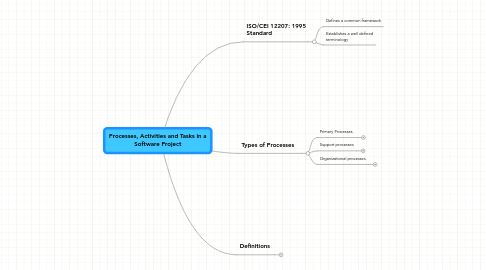
1. ISO/CEI 12207: 1995 Standard
1.1. Defines a common framework
1.2. Establishes a well defined terminology
2. Definitions
2.1. Process - an assembly of resources and interdependent activities oriented to a well defined purpose
2.2. Activities – are parts of a process consisting in types of actions through which, process resources are used for project purpose
2.3. Tasks – are components of activities consisting in one, or an assembly of actions
2.3.1. can be related with a person or a group of persons having the responsibility of their accomplishment
2.3.2. A time horizon can be established or estimated
2.3.3. A cost can be estimated
3. Types of Processes
3.1. Primary Processes
3.1.1. Definition: PRIMARY PROCESSES are the processes deserving the main parts (actors) of a SW project: acquisition, supplier, developer, operator (user) and maintainer of the product
3.1.2. Classification
3.1.2.1. Acquisition Process – defines the activities through which an organization acquires a system, a product or a SW service
3.1.2.2. Supplying Process – defines the activities through which an organization supplies a system, a product or a SW service
3.1.2.3. Development Process – consists in activities through which an organization defines and elaborates a system, a product or a SW service
3.1.2.4. Utilization Process – defines the activities through which an organization utilizes a system, a product or a SW service
3.1.2.5. Maintenance Process – defines the activities through which an organization supplies maintenance service for a system, a product or a SW
3.2. Support processes
3.2.1. Definition: SUPPORT PROCESSES are processes which support other processes. They contribute to the success and the quality of a SW project.
3.2.2. Classification
3.2.2.1. Documentation Process
3.2.2.1.1. Includes the activities concerning the definition and recording of all information resulted from the SW developing process.
3.2.2.1.2. Presumes user documentation as well as documents related to developing process: plans, reports, specifications, internal standards, associated documents, internal procedures.
3.2.2.2. SW Configuration Management Process
3.2.2.2.1. consists in administrative and technical procedures which
3.2.2.3. Quality Assurance Process
3.2.2.3.1. defines the assembly of activities which assure in an objective manner that
3.2.2.4. Testing Process
3.2.2.4.1. Defines the assembly of activities having as purpose the verification of the products resulted from developing activities, which satisfy imposed requirements and conditions.
3.2.2.4.2. The verification has different degrees of depth depending on the activity whose product is tested
3.2.2.5. Validation Process
3.2.2.5.1. Defines the assembly of activities which verifies if a SW product which is in a final phase, satisfies the planned utilization requirements (covers the user’s needs resulted from the analyze process)
3.2.2.6. Common Analyze Process
3.2.2.6.1. Is the process of analyze/evaluation of the state of a process or product.
3.2.2.6.2. It’s a periodical process which involve the two parts implied in project (usually developer and purchaser or supplier) and focus on either the analyze of SW product requirements or the measurement of the “pulse” of the project
3.2.2.7. Audit Process
3.2.2.7.1. Contains the activities oriented to certify the conformity with norms, requirements, schedules, and statements of the contract for a product or a SW process.
3.2.2.7.2. They are accomplished during the development of the activity or task, and not at the end, as in the case of test or validation process
3.2.2.7.3. The auditing part has no direct responsibilities in the implied products and processes, element that differentiates the auditing process from the common analysis one.
3.2.2.8. Problems Solving Process
3.2.2.8.1. Includes activities concerning analyze and solving of the problems (non-conformities, functional errors, unexpected situations)
3.3. Organizational processes
3.3.1. Definition: ORGANIZATIONAL PROCESSES are processes related to the management, infrastructure, training, and improving
3.3.2. Classification
3.3.2.1. Management Process
3.3.2.1.1. Defines the basic activities related to the management of any process
3.3.2.2. Infrastructure Process
3.3.2.2.1. Consists in all the activities concerning establishing, achieving and maintaining the infrastructure of any process.
3.3.2.2.2. By infrastructure we mean hardware, software, tools, techniques, standards and facilities for development, exploitation and maintenance.
3.3.2.3. Training Process
3.3.2.3.1. Specifies the set of activities for training and maintaining the professional level of the personnel.
3.3.2.3.2. The main effort is directed to improve the knowledge and to increase the qualification of the personnel.
3.3.2.4. Improving Process
3.3.2.4.1. Consists in the set of activities oriented to definition, evaluation, measurement, control and improvement of any process.
